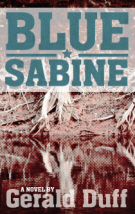|
Dirty Rice: A Season in the Evangeline League Reviewed in The Louisiana Voice
 The following review of Dirty Rice: A Season in the Evangeline League was published on LouisianaVoice.com on May 22, 2012: The following review of Dirty Rice: A Season in the Evangeline League was published on LouisianaVoice.com on May 22, 2012:
"Dirty Rice: A Season in the Evangeline League” (UL Press): a wonderful read for the avid Louisiana baseball historian
May 22, 2012 by tomaswell
LouisianaVoice does not normally offer book reviews but we would like to make an exception with Dirty Rice: A Season in the Evangeline League, a novel by Gerald Duff.
If you are a fan of the grand old game and you are into baseball lore, this book is for you.
Published by the University of Louisiana at Lafayette Press, Dirty Rice (306 pages) http://www.ulpress.org/ tells us the story of Gemar Batiste, who is recruited from the Alabama-Coushatta Indian Reservation in Texas to pitch and play outfield for the Rayne Rice Birds in 1935.
Gemar, we learn soon enough, is a spiritual player who clings to his cultural lore but who also possesses all the odd superstitions that are peculiar to baseball players (step over the line, never on it; do not cross the bats, lay them side by side; at all costs, avoid speaking to or making eye contact with a pitcher who is pitching a no-hitter).
All but one of the characters is fictional. The lone exception is Roderick “Hookey” Irwin, a right-handed pitcher who in 1934 led the Evangeline League with a record of 21-4. Irwin just happens to be the uncle of author Duff.
Duff, a native of the Texas Gulf Coast, has taught literature and writing at Vanderbilt University, Kenyon College, Johns Hopkins University, and St. John’s College in Oxford. He also served as Academic Dean at Rhodes College, Goucher College and McKendree University.
The Class D Evangeline League, Duff tells us, was also known as the Hot Sauce League. Cajun humorist Justin Wilson referred to it in his stories as the Hot Pepper League. Its teams were spread out all over Louisiana, from Morgan City to Monroe, from Lake Charles to Hammond during its history from 1934 (when Rayne was the Red Sox) to 1951. Depending on the year, foreign teams from Port Arthur, Texas, and Natchez, Mississippi slipped in and out of the league. Rayne’s last year of competition in the league was 1941.
Batiste and another rookie, Mike Gomez, share a room in a local residence owned by a “Miz Doucette.” Gomez, an African-American from Mobile, Alabama, is officially listed as Cuban but to the locals he is considered a redbone, a racial mixture indigenous to South Louisiana. That was the only way he could qualify to play on an otherwise all-white team during the pre-Jackie Robinson years. And of course, his situation leads to problems near the end of the 1935 season, a season in which Rayne chases Opelousas for the league championship.
The real Evangeline League was hit by a betting scandal in 1946 and four members of the Houma Indians and one from Abbeville Athletics were suspended though the allegations of throwing games was never proven.
A professional gambler with ties to Sen. Huey Long (the Kingfish) moves in and out of the fictional Rice Birds’ locker room with apparent ease and Gomez is soon entangled in his web and predictably, makes key throwing errors that cost his team games in order to supplement his $50 per month salary.
Gomez knows his career is fated to never advance beyond the Evangeline League because of his color so he determines to take advantage of any financial opportunity presented him. We will leave it to you to discover whether or not Gomez is suspended, allowed to play, or if he ultimately costs his team the championship.
Duff is obviously a student of baseball; he simply knows too many of the nuances for him not to possess a deep understanding of the game within the game that is baseball. He approaches the game with the same mentality of a seasoned player—even down to anticipating what the pitcher will throw in a given situation and how to play a batter based on his batting stance and what the pitcher is throwing.
His dialogue between characters tends to drag to the point of becoming a distraction but we can attribute that to the differences in the culture of South Louisiana Cajuns, African-Americans and Native Americans.
Throw in the doomed would-be romance between Gemar Batiste and Teeny, Miz Doucette’s daughter, and you have the complete novel.
Duff has done a masterful job of capturing the unbridled enthusiasm that minor league baseball enjoyed in Louisiana during the heyday of the Evangeline League. Regrettably, all he can give us is the memory of that wonderful bygone era of Louisiana professional baseball.
But at least we have that."
To read the complete review online, click here.
|



